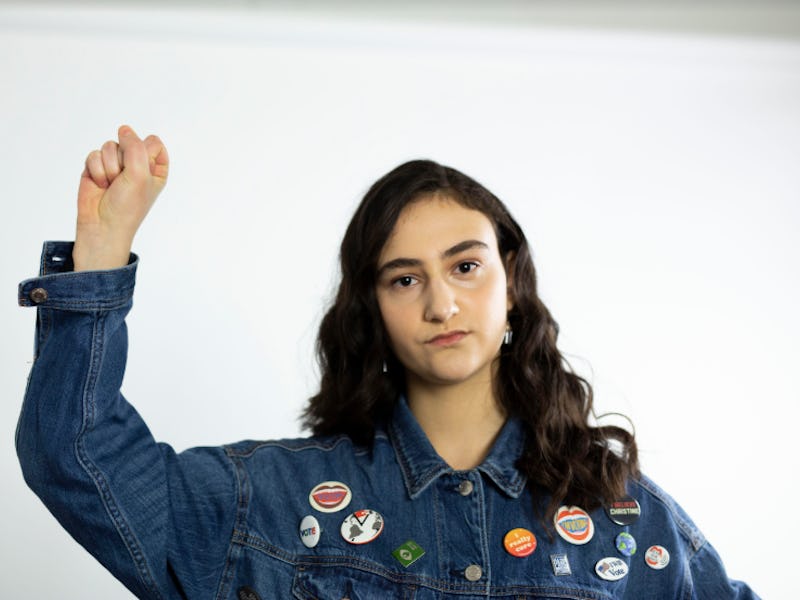Jamie Margolin: Teen Activist Is a Leading Voice in the Climate Crisis
Jamie Margolin isn't a future leader. She's leading now.

On Friday waves of youth protests rippled across the United Kingdom calling for climate action. This movement emerged just one month after a global youth strike where more than a million students took to the street and demanded society drastically improve the way it responds to the climate crisis.
While it takes many organizers to make a movement, and climate activism has a storied history, these recent events can be linked back to a teenager in Seattle, Washington. Seventeen-year-old Jamie Margolin is a junior in high school. She enjoys reading, drawing, and writing. She also spends five to six hours a day specifically working to combat the climate crisis.
Those hours — minutes piled on top of going to school, doing homework, and having a life — she tells Inverse are piled into conference calls, emails, writing, fundraising, social media, and working on a documentary. Margolin is the founder of and co-executive director of Zero Hour, a youth and women of color led organization dedicated to intersectional climate activism.
Zero Hour, Margolin learned from Greta Thunberg — the Swedish teen whose own climate strike inspired millions of others to do the same — partially inspired her to Thunberg to take a stand. Margolin herself was inspired by the indigenous youth who led the protest against the Dakota Access Pipeline at Standing Rock.
“To know that Zero Hour helped lay the groundwork for such a massive movement is an amazing feeling,” Margolin says. “But there’s so much more than needs to be done and the way that climate change is being talk about right now needs to change.”
Margolin founded Zero Hour when she was 15 after processing two disheartening events. One was the destruction of Hurricane Maria, the Category 5 hurricane that devastated Puerto Rico. The other was experiencing the struggle it took to breathe in Seattle after the city was covered in smoke from Canadian wildfires. The Washington native, already a community organizer, said enough is enough.
“Watching the incredibly racist nonresponse toward Puerto Rico after Hurricane Maria — which was clearly a climate crisis yet the media acted like it wasn’t climate caused — and literally not being able to breathe clean air for two weeks were the catalysts,” Margolin says.
She rallied friends and launched Zero Hour in the summer of 2017 and by the next summer, they organized a national event. Over the course of three days in July, Zero Hour lobbied Congress, urging them to refuse money from fossil fuel companies, hosted a youth art festival, and led a march through the nation’s capital. At the same time over 25 sister marches took place around the world — with teenagers in London, Kenya, and Las Vegas making the same demand. Their governments needed to address the roots of climate change and take immediate action.
Climate change is something that Margolin fiercely needs to be attacked at all angles.
“Yes we have to be protesting and lobbying,” she points out. “But we also have to be organizing in our communities; doing education work. We have to be addressing the issue in the courts. We can’t pretend like we have the luxury of choosing one solution.”
Margolin emphasizes that protesting is not an effective way of making long term change — you can’t be on the streets 24/17. As a young social activist disrupting the status quo, she’s learned that if your end goal is to turn people out in the streets, then that’s the end of your movement. Sometimes you need to make a ruckus and sometimes you need to take action that results in something meaningful. Finding the balance, she says, is key.
Now Zero Hour is working on a campaign called “Get to the Roots” which is more focused on addressing how climate change is taught and discussed. It’s important to the activists behind Zero Hour that climate change is addressed the culmination of the systems of oppression that caused it: colonialism, racism, and capitalism.
“If we’re not addressing this issue through that lens — if we’re not having a social justice approach, not taking intersectional action and highlighting the voices that are on the front lines of the issue, then we are not addressing the root causes of climate change,” Margolin says.
Margolin is ready to fight but, as she puts it, she wants to fight climate change properly. Youth protest is not about being a hashtag-activist or achieving clout — it’s about changing a system that’s ruled by people who secured power before they were born.
“It’s not about coming off as liberal or woke,” Margolin says. “It’s that literally we won’t survive this if we can’t solve it correctly.”